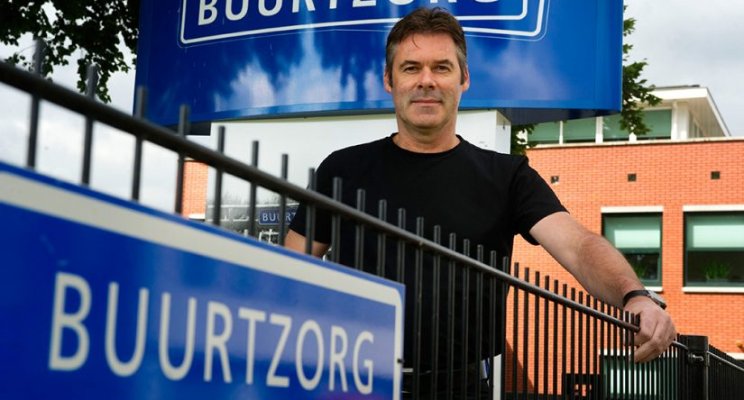Interview with Jos de Blok, March 2017, by Anna Betz for Enlivening Edge Magazine

Jos, you are famous for having created a self-managing organisation, Buurtzorg, in Holland, from the beginning, from scratch, and now in the UK you are working with the National Health Service and its extensive already-existing structures. What are your experiences and insights about particular challenges and opportunities that such a difference represents?
I see several things. We see that a lot of NHS nurses recognise the way of working modeled by Buurtzorg as familiar. Certainly the nurses over 50 who trained 30 years ago remember this was the way they worked, before. District nurses traditionally had quite a strong position in the British system. However, step by step this has disappeared, just like in Holland. What has changed were the organisations and how they were managed, becoming based on hierarchical management.
A lot of managers have actually been nurses who are now also stuck in a paradigm of business operation management and hierarchical thinking. Despite their knowledge of good nursing practice and good intentions, they are finding it quite difficult to influence the structures of the existing systems.
On the plus side you see that those nurses who want to participate in innovative projects continue to have conversations with their colleagues and their bosses asking how to move on. They want to know what the Buurtzorg way of working is all about.
When we work with old institutional structures like the NHS we need to spend a lot of time with managers to explain the Buurtzorg way of working. That means we can’t spend enough time with the nurses.
The NHS is quite a traditional organisation. Making next steps and finding a way to move forward in these projects is a struggle. At the same time there are a lot of people who are interested.
Every week there are new organisations that ask, “Can we work with you? Can we start to offer projects?”
Can you say something about the project that you started in Guys and St. Thomas hospital?
They took the responsibility to start a Buurtzorg type of team in London and recruited nurses for this project. These nurses are now working in one of the neighbourhoods in London. From what I have heard it is going well. I am meeting with them in Holland shortly. They are good professional nurses and on the professional side it is going quite well.
On the organisational side it is however quite complicated. Guys and St. Thomas is a very old and traditional organisation, a very big, hierarchic, and bureaucratic organisation. There is a tension with part of the organisation, but the ones responsible for this project are nurses who used to be district nurses, which helps.
They have some kind of allegiance to the organisation, and make this kind of work possible. I think in an organisation like Guys and St. Thomas, creating a different experience is quite a big step.
That step is also quite helpful, as the new self-organising teams can become examples of how providing healthcare with Buurtzorg-style teams can work in an existing organisation with an existing structure.
Would you call the way those nurses work and learn together a community of practice, meaning they are both a community of learners and a community that learns?
What we have created is a learning environment. People are learning; the group is learning; the organisation is learning. We called it something like learning and testing. It is about learning. You have to learn from the first projects how it can be done. You have to build trust and work together so that it can lead to the right thing.
From a healthcare perspective, the questions would be:
Is this new way of working leading to good healthcare from the perspective of the organisational leadership in the National Health Service? Is it leading to good healthcare from the nurses’ point of view? Does the autonomy they have give them more space to deliver quality of care?
Then from the financial side the question would be: Does it fit into a sustainable business model?
We have to learn in different ways, and it is happening now. I am very curious about the results.
How long will the work at Guys & St. Thomas remain a pilot? What is the time frame?
I think it is about a year. I am having conversations with Guys and St. Thomas at strategic moments.
The people responsible for the project will come to Holland next week and we will have some kind of evaluation. So I will know more about the present situation after that meeting.
How many nurses are involved in that pilot?
Four or five months ago they started with three nurses, and I don’t know how many there are now.
What is your message to the many established organisations with existing behaviours, structures and cultures that are not conducive to radical innovation? Where do they start? They’re not start-ups which can choose the Teal way from the beginning.
What is best and works as a strategy in Holland with other organisations is to start with a clean field by isolating parts of the organisation.
It can be just a small part. They must try to disconnect it. If you have the traditional management structure which is responsible for a project, then you will see the thinking is top down. It is about targets, and all the traditional management language will remain dominant. You can talk about new ways of working but the culture and behaviour will stay the same and thus nothing will change.
I always say you have to create an environment informed by sociological and psychological principles. If you create an enabling environment, then things can grow and happen. It will change the behaviour of the people who are working in this environment. If you stay in the same environment, it is much more difficult to change behaviour. You can do culture programmes and other things, but I don’t believe in that approach.
If you want a more radical change, you need to create another environment. You can then learn from that environment and show that the results are much better than what you see in the existing environment. This then leads to people feeling motivated which gives you good reasons to adopt working like this in the rest of the organisation. That is how we were very successful with a number of organisations.
Would you say that the relationships you build in small groups are fundamental for culture change? Would you incubate the new behaviours in a small group first?
Yes, if you isolate a group of people they will show another behaviour. They show that it is actually not so difficult to organise all the work themselves, which also leads to much better result. You simply can’t ignore it. The moment you see this new way of working, that becomes a source of inspiration.
Our experience in Holland was that these kinds of starting groups were actually advertising to their colleagues stating: ‘It is much better, much easier, much simpler than we thought it was.’
Within the NHS structure, how would one go about creating isolated groups? What would be your advice to nurses about how to do that?
There are different options. From the nurse perspective I would say: Try to find a way to start yourself in a new context. Buurtzorg started outside an existing organisation as a new organisation or a new network. There are nurses who are doing it already. They are resigning and starting with a group of nurses.
Then on the other side, if people in the organisation are already motivated, like the district nurses or other parts of care, I would suggest the same. Try to isolate groups and do the projects I just described.
For a bigger organisation, it is almost no risk at all when you have 5-6 nurses who are doing a pilot.
The financial risks are very low and you can learn a lot from it. However, it would still be important for nurses to create something themselves outside of an organisation.
I hope that in the coming year there will be some pilots of nurses who will start their own small company.
What kind of company are you thinking of? In the UK we have different models such as Ltd, CIC, CIO, Charity and others.
If you want to focus on the higher purpose and connect with the values of nurses, then I would choose a not-for-profit. People have tried that in Holland. A for-profit organisation creates different incentives. It would risk privatising the NHS.
The minister of Health in Holland who is a Liberal said: “It is good that Buurtzorg is doing so well and it is an example of the market, the way the market works.” My reply to this is always: “No, the reason why Buurtzorg is working so well is because it is repairing the damage of the market.”
I think healthcare should be public. You can have entrepreneurial incentives for the nurses but when it comes to the purpose in healthcare, you should focus on the public interest. What I have seen in Holland, where there are market incentives, the focus changes from delivering good healthcare to earning money.
What aspects of the Buurtzorg model are easy to apply and which ones are not easy to apply?
I think you can make a split between the hard things and the soft things. The hard thing is the structure, the tactical ways of working What is very difficult for some people is the cultural thing. Style, behaviour, thinking bottom-up instead of top-down. Supporting instead of directing.
There are a lot of things that are part of behaviour. When you have been leading an organisation for a long time in a certain way, you are usually not aware of your style and the impact you have when you are making the strategic plans, policy plans and other plans driven by targets. That’s usually top-down. It has a huge impact on the daily practice of people.
To change this behaviour, a lot of people who are now in management positions are not able to learn how not to work in a top-down way. They fit well into a hierarchical system, and they don’t fit into a Teal system.
What we are encouraging and enabling is self-reflection, consciousness and awareness about the difference between this behaviour and that behaviour. Also what are the practical things which come out of this or that behaviour?
You do different things when you think or direct in a hierarchical way than when you have to listen, feel, be sensitive and make decisions in a non-hierarchical way. For some people it is very natural to work in a non-directive and non-hierarchical way.
For some people who have been leading organisations for a long time it is sometimes impossible for them to change. There is a book in Holland with the title Am I crazy or Are They? It’s about the way professionals work and think. Nurses, teachers, and policemen can’t explain to their managers the problems they meet in daily practice.
Leaders and managers in the present system of the NHS think in terms of systems and not in terms of people. They divide the behaviour of people into system-like behaviour and human behaviour. If you have been doing things too long from this system’s point of view it is quite difficult to learn the human element.
On the other hand, if you have a CEO who understands this cultural thing, and his behaviour is an example of showing this behaviour, then your organisation can learn very fast. If this CEO is only using words that look/sound like Teal but is behaving differently, that can even damage the organisation.
Finally, what is your message to health professionals, patients, communities and NHS leaders in the UK?
To health professionals in the UK:
Take your profession seriously. Take responsibility for developing your profession. Contribute to an environment where you can express your professional ethics in your daily work and make those ethics lead what you are doing.
To patients/citizens/communities:
See yourself as experts of your life. You know what works and what doesn’t work. Try not to depend on healthcare systems. Try to participate in decision-making or in groups that can organise things themselves. Try to influence policies and try to start something yourself if possible.
In Holland you see a lot of neighbourhood organisation, people who have ideas and other resources and start a Cooperative. People meet in the neighbourhood and try to solve problems.
To NHS leaders in the UK:
Step into the shoes of patients and step into the shoes of healthcare workers. Try to see that if we don’t change things, we will be spending too much money on the wrong things. If as a leader you want to use the resources as well as possible, try to find out what the real perspectives of the clients and the nurses and the doctors are. Try to facilitate those perspectives instead of creating bureaucracies.
 Anna’s background is in Health and Social Care with training in Herbal Medicine, Socialwork, Mindfulness Practice, Transparent Communication, and Systemic Family Therapy. She practices a pro-active evolutionary approach to Health and Wellbeing and leads on projects in the UK National Health Service using Mindfulness and diet for people suffering from chronic inflammatory diseases like diabetes and dementia.
Anna’s background is in Health and Social Care with training in Herbal Medicine, Socialwork, Mindfulness Practice, Transparent Communication, and Systemic Family Therapy. She practices a pro-active evolutionary approach to Health and Wellbeing and leads on projects in the UK National Health Service using Mindfulness and diet for people suffering from chronic inflammatory diseases like diabetes and dementia.
Her passion for building thriving and sustainable communities inspired her to co-found the HealthCommonsHub. She feels at home in places where individual, communal, organisational, and social evolution meet, and where people support each other in becoming whole and feel enlivened.




